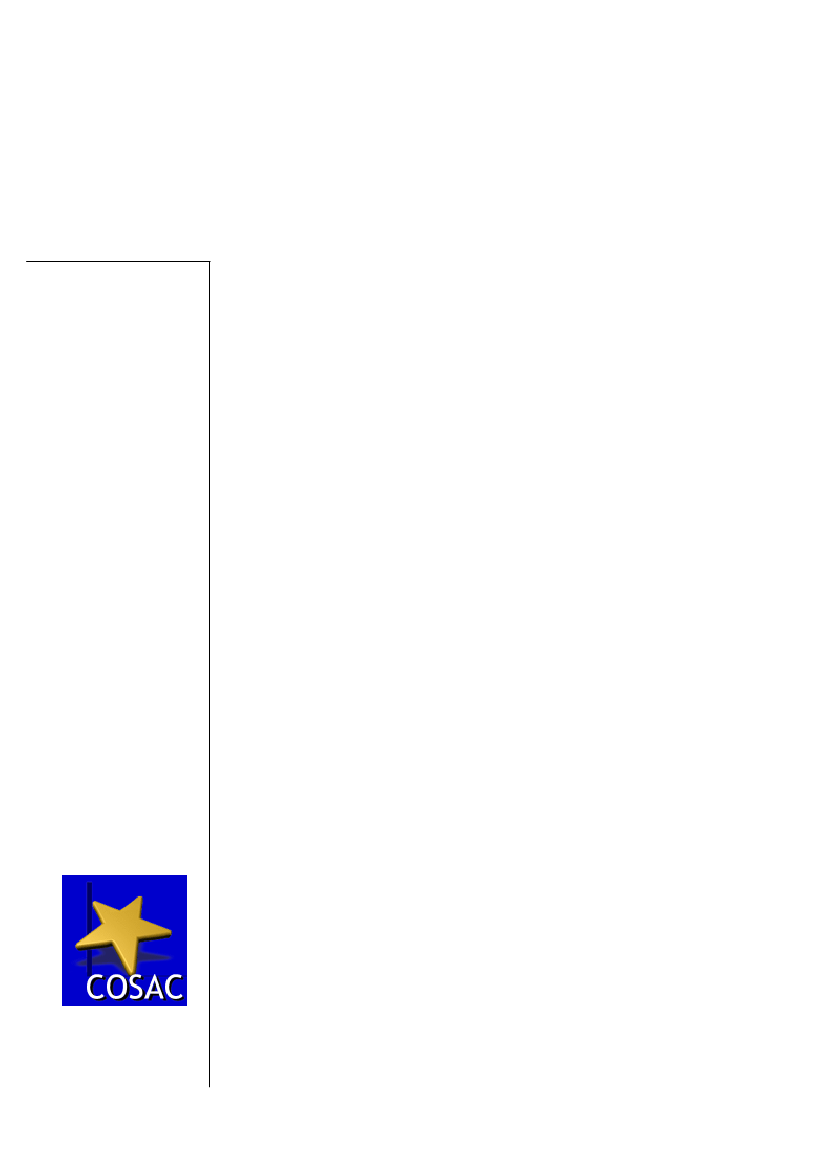Europaudvalget 2010-11 (1. samling)
EUU Alm.del Bilag 54
Offentligt
October 2010
Fourteenth Bi-annual Report:Developments in European UnionProcedures and PracticesRelevant to Parliamentary Scrutiny
Prepared by the COSAC Secretariat and presented to:XLIV Conference of Community and European AffairsCommittees of Parliaments of the European Union25 - 26 October 2010Brussels
Conference of Community and European Affairs Committees of Parliamentsof the European Union
COSAC SECRETARIATWIE 05 U 041, 30-50 rue Wiertz, B-1000 Brussels, BelgiumE-mail:[email protected]| Fax: +32 2 284 4925
2
Table of ContentsBACKGROUND........................................................................................................................ 4ABSTRACT............................................................................................................................... 5CHAPTER 1: SUSTAINABLE DEVELOPMENT IN THE EUROPE 2020 STRATEGY.......... 91.1. Debates in National Parliaments .................................................................................... 101.1.1. The EUROPE 2020 Strategy, a Well-Integrated Concept?....................................... 101.1.2. Economic and Scientific Developments in the Rest of the World ............................ 111.1.3. The Social and Environmental Consequences of the EUROPE 2020 Strategy ......... 111.2. The EUROPE 2020 Strategy and the EU Strategy for Sustainable Development ............ 121.2.1. Reflection of the Challenges of the EU Strategy for Sustainable Development in theEUROPE 2020 Strategy.................................................................................................... 121.2.2. Instruments of the EUROPE 2020 Strategy ............................................................. 141.3. The EUROPE 2020 Strategy and National Parliaments .................................................. 14CHAPTER 2: PARLIAMENTARY SCRUTINY OF THE COMMON SECURITY ANDDEFENCE POLICY................................................................................................................. 172.1. Added Value of an Interparliamentary Exchange on CFSP and CSDP ........................... 192.2. The Scope of the Interparliamentary Cooperation and Scrutiny...................................... 192.3. The Modalities for Interparliamentary Cooperation and Scrutiny ................................... 202.3.1. New Special Mechanisms, Structures and Fora ....................................................... 202.3.2. Involvement of COSAC .......................................................................................... 212.3.3 Involvement of COFACC and/or CODAC ............................................................... 232.4. Funding of the Interparliamentary Scrutiny of CFSP and/or CSDP ................................ 252.5. Involvement of the European Parliament in the Interparliamentary Cooperation on CFSPand/or CSDP ........................................................................................................................ 26CHAPTER 3: THE FUTURE ROLE OF COSAC AFTER THE ENTRY INTO FORCE OF THETREATY OF LISBON - CONTINUATION OF THE DEBATE OF THE XLIII COSACMEETING ............................................................................................................................... 283.1. Monitoring role of COSAC............................................................................................ 283.2. Early-Warning System................................................................................................... 293.3. Debate on Commission's Work Programme ................................................................... 303.4. Keynote Speakers from outside the European Union on CFSP and/or CSDP.................. 323.5. Political Monitoring of Europol and Evaluation of the Activities of Eurojust ................. 323.6. Involvement of Specialised Committees in COSAC....................................................... 333.7. European Week ............................................................................................................. 343.8. New technologies .......................................................................................................... 353.9. Amendment of the COSAC Rules of Procedure ............................................................. 36
3
BACKGROUNDThis is the Fourteenth Bi-annual Report from the COSAC Secretariat.
COSAC Bi-annual ReportsThe XXX COSAC decided that the COSAC Secretariat should producefactual Bi-annual Reports, to be published ahead of each ordinary meetingof the Conference. The purpose of the Reports is to give an overview of thedevelopments in procedures and practices in the European Union that arerelevant to parliamentary scrutiny.All the Bi-annual Reports are available on the COSAC website at:http://www.cosac.eu/en/documents/biannual/
The three chapters of this Bi-annual Report are based on information provided by the nationalParliaments of the European Union Member States and the European Parliament.Each chapter begins with the relevant part of the outline adopted by the meeting of theChairpersons of COSAC, held on 5 July 2010 in Brussels.As a general rule, the Report does not specify all Parliaments or Chambers whose case isrelevant for each point. Instead, illustrative examples, introduced in the text as “e.g.”, are used.The COSAC Secretariat is grateful to the contributing Parliaments for their cooperation.
Note on NumbersOf the 27 Member States of the European Union, 14 have a unicameralParliament and 13 have a bicameral Parliament. Due to this combination ofunicameral and bicameral systems, there are 40 national parliamentary Chambersin the 27 Member States of the European Union.Although they have bicameral systems, the national Parliaments of Austria,Belgium, Ireland, Romania and Spain each submitted a single set of replies to thequestionnaire circulated by the COSAC Secretariat.The COSAC Secretariat received replies from all 40 national Parliaments /Chambers of 27 Member States and the European Parliament. These replies arepublished in a separate Annex to this Bi-annual Report which is also available onthe COSAC website at:http://www.cosac.eu/en/documents/biannual/
4
ABSTRACTCHAPTER 1: SUSTAINABLE DEVELOPMENT IN THE EUROPE 2020 STRATEGYAbout one in three Parliaments/Chambers reply that, up to now1, they havenot (fully) discussedthe integration of the notion of "sustainable development" into the EUROPE 2020 Strategy.An overwhelming majority of the respondents having reached a final opinion on the matter,report that they consider the Strategy to bea well integrated conceptalbeit that only a minorityof them do this unconditionally.Some other Parliaments/Chambers hold the view that the integration of sustainable developmentis insufficient.Only a few Parliaments/Chambers have not positioned themselves on this particular issue yet.Half of the Parliaments/Chambers having discussed the matter, are of the opinion that theStrategy sufficiently takes into accountthe economic and scientific development outside theEUalthough, here too, most do not do this without formulating conditions.Only a few Parliaments/Chambers disagree with this opinion.Another quarter reply that they have not reached a final position on this point yet.A small majority of the Parliaments/Chambers with a final position, report that the Strategysufficiently takes into accountthe social and environmental consequences as well as respectfor human rights.However, about one in four Parliaments/Chambers are of the opposite opinion.A few Parliaments/Chambers have not answered this question.Almost half of the Parliaments/Chambers do not offer specific answers to the questions asked onthe sustainable development related aspects of the EUROPE 2020 Strategy, either because theyhave not treated this issue or have done so only in general terms.Most Parliaments/Chambers share apositive view on the way the challengesof the EuropeanUnion Strategy for Sustainable Development have beenreflectedin the EUROPE 2020 Strategy.However, several Parliaments/Chambers consider that the following five challenges onsustainable development are not sufficiently reflected in the EUROPE 2020 Strategy: "climatechange and clean energy", "sustainable transport", "sustainable consumption and production","public health" and "social inclusion and demography and migration".A vast majority of the Parliaments/Chambers consider theinstrumentsforeseen in the EUROPE2020 Strategy for meeting these challenges assufficient;even though the cooperation betweenthe Member States and the EU institutions should be strengthened, and targets should be realisticand quantitative. The possibility of sanctions is also mentioned by some Parliaments/Chambers,in order to improve the efficiency of the implementation of the EUROPE 2020 Strategy.Although a relevant number of Parliaments/Chamber that have submitted the answers to thequestionnaire have not provided any comment on the questions regarding theinvolvement ofnational Parliamentsin the oversight of the EUROPE 2020 Strategy, a significant number of1
5 October 2010
5
Parliaments/Chambers consider that thedecision-making processlinked to the EUROPE 2020Strategy issufficiently stringentfor the Member States and that the oversight by nationalParliaments is assured to a sufficient extent. On the other hand, some Parliaments/Chambersvoice their concerns about the limited oversight of national Parliaments, as well as insufficientstringency for the Member States of the decision–making process.In relation to theparliamentary bodies that will be in charge of the follow-upof the EUROPE2020 Strategy, a large variety of bodies and procedures will be involved at committee level. Insome Parliaments/Chambers, the Committee on European Affairs will be solely in charge or willhave a leading role coordinating the specialised committees. In other Parliaments/Chambers, thespecialised committees will take decisions without the coordination of a Committee on EuropeanAffairs. In a number of Parliaments/Chambers, the plenary will be eventually involved.In relation to themeans at the Parliament/Chamber’s disposalto make the Governmentaccountable for its actions in relation to the Strategy, a number of Parliaments/Chambers refer tothe powers of the Parliament to monitor the Executive and the Government’s duty to justify itsactions. In some Parliaments/Chambers, the Government has a duty to consult theParliament/Chamber on these issues.Parliaments/Chambers suggest a number of means tostrengthen the sustainable developmentaspect of the EUROPE 2020 Strategy, like regular parliamentary monitoring of the implantationof the Strategy - which may comprise the national targets, the National Reform Program and thenational budget -, maintenance of contacts with NGOs and other stakeholders, provision ofinformation to the national population, exchange of information and best practice, activeparticipation in decision-making process, organisation of public conferences, elaboration of self-evaluation procedures, focusing on policy content or the upholding of a political dialogue withthe EU institutions.CHAPTER 2: PARLIAMENTARY SCRUTINY OF THE COMMON SECURITY ANDDEFENCE POLICYReplies of the Parliaments/Chambers indicate that the issue of parliamentary scrutiny of thecommon foreign and security policy (henceforth "CFSP") and common security and defencepolicy (henceforth "CSDP") is ofsignificant importanceto both national Parliaments and theEuropean Parliament. However, more than one third of the Chambers/Parliaments state that theyhave not yet expressed an official position on this issue, are in the process of discussing the issueand/or are planning to so in the near future.A majorityof Parliaments/Chambers agree that interparliamentary exchange on CSFP and/orCSDP isuseful and helpfulin improving parliamentary scrutiny at the national and/or the EUlevels; some of them consider such scrutiny even asindispensiblein a post-Lisbon context.Some other Parliaments/Chambers seem to be more cautious in their attitudes while a fewquestion the efficacy of the scrutiny at the EU level, considering the national level to be moreappropriate.A majorityof Parliaments/Chambers consider that the interparliamentary scrutiny at the EUlevel shouldcover both CFSP and CSDP,as these two policy areas are closely interconnected.
6
Ten Parliaments/Chambers consider thata new special mechanism, structure or forum shouldbe set upto organise interparliamentary cooperation on and scrutiny of CFSP and/or CSDP. Thepreferred form of such a new forum is that ofan (interparliamentary) conference(in somecases modelled on COSAC). The form of an interparliamentary committee meeting is cited intwo cases.Other Parliaments/Chambers considerexisting forato be the best solution to organisecooperation and scrutiny of CFSP and/or CSDP, including the options of keeping the existingform/reforming and/or merging COSAC with the existing meetings of COFACC2and CODAC3.A significant number of Parliaments/Chambers consider thatCOSACshould be involved in oneor another way in the organisation of the interparliamentary cooperation on and scrutiny of CFSPand/or CSDP. Some Parliaments/Chambers favour COSAC as the main (but not necessarily theonly) forum for dealing with the subject matter, while others prefer COSAC cooperating withCOFACC and/or CODAC. Another significant group of Parliaments/Chambers gives preferencetoCOFACC and CODAC or a combination of the twoas the scrutiny of CFSP and/or CSDPis already within their remit. Some Parliaments/Chambers also suggest involving COSAC, eitherat a practical level (organisation, secretarial support, etc.) or at a substantive level (exchange ofinformation).As to thefundingof the interparliamentary scrutiny of CFSP and/or CSDP, amajorityofParliaments/Chambers do not have a clear position primarily because of the lack of a decision onthis issue. The Parliaments/Chambers which support the idea of a financial contribution arecautious and prefer meeting the needs within the framework of their existing budgets or makingfunds available in a limited manner. Some low-cost solutions are also advanced.Regarding thecompositionof the forum responsible for the interparliamentary cooperation andscrutiny of CFSP and CSDP, a vast majority of Parliaments/Chambers express their support foramixed bodywhich includes Members of both national Parliaments and the European Parliament,the latter being granteda member status.CHAPTER 3: THE FUTURE ROLE OF COSAC AFTER THE ENTRY INTO FORCEOF THE TREATY OF LISBON - CONTINUATION OF THE DEBATE OF THE XLIIICOSAC MEETINGIn general, Parliaments/Chambers aresatisfiedwith the work of COSAC. A vast majority ofthem consider that monitoring of national Parliaments' role under Article 12 of TEU by COSACis best carried out byexchanging information and best practicewith the help of Bi-annualReports of COSAC as well aspromoting dialogue on EU matters.According to some Parliaments/Chambers, COSAC shouldregularly debate the role ofnational Parliaments in European affairswith a special attention given to the monitoring oftheimplementation of the provisions of the Treaty of Lisbon,related to the new powers ofnational Parliaments.Parliaments/Chambers offer a wide range of ideas on how COSAC could contribute to theeffective functioning of theEarly-Warning Systemas established in Protocol 2. In the majority23
I.e. Meeting of the Chairpersons of the Committees on Foreign Affairs of national Parliaments.I.e. Meeting of the Chairpersons of the Committees on Defence of national Parliaments.
7
opinion, COSAC can facilitate enhancement of the ability of national Parliaments to individuallydetermine whether EU draft legislative acts comply with the principle of subsidiarity.Specificproposalson how such a role of COSAC could be developed include (bi-annual/annual) debateson subsidiarity, sharing of information on planned subsidiarity checks in national Parliaments,publication of a regularly updated list of EU draft legislative acts to be subjected to subsidiaritychecks by national Parliaments, assuming a monitoring role, including alerting nationalParliaments on reasoned opinions issued by other Parliaments/Chambers, and conducting debateson subsidiarity concerns over specific EU draft legislative acts. However, Parliaments/Chambersseem toremain dividedas to the continuation of the pre-Treaty of Lisbon practice of conductingCOSAC-coordinated subsidiarity checks.All Parliaments/Chambers which responded to the questionnaire seem to agree on the addedvalue of the debates on theCommission's Work Programmein the framework of COSAC.However, several of them point out potential timing problems and consider such debates usefulonly if the publication of the Work Programme is close to the date of a COSAC meeting.A majority of Parliaments/Chambers welcome the idea of invitingkeynote speakers fromoutside the European Union(e.g. the NATO Secretary General, the U.S. Ambassador, etc.) toaddress COSACon CFSP and/or CSDP.Some of them, however,condition their supportonthe pending decision of whether COSAC is the forum for debates on CFSP/CSDP.As to hearings of representatives ofEuropol and Eurojustin COSAC, several Parliaments/Chambers indicate that it is difficult to give a final answer before the Commission consultationwith national Parliaments and the European Parliament has been conducted and the Regulationson Europol and Eurojust based on Articles 85 and 88 of the TFEU are published. However, amajority of Parliaments/Chambers which have formulated their position support the idea ofCOSAC debates on Europol and Eurojust being preceded by hearings of representatives ofEuropol and Eurojust as well as introductory evaluations by representatives of the academicworld, judiciary and /or law enforcement services.Parliaments/Chambers see a general need for better and closer cooperation amongspecialisedparliamentary committeesin view of the growing interconnection between subjects discussedat the EU and the national levels. Since thecomposition of the COSAC delegationsis anautonomous right of each Parliament/Chamber, a number of them see a possibility of involvingspecialised committees in the work of COSAC by including in the delegations Members of theirspecialised committees. However a slightly lower number of Parliaments/Chambers explicitlystate that cooperation among specialised committees should be strengthened independently,without a formal link to the framework of COSAC or agree with the involvement of specialisedcommittees in COSAC on an ad hoc basis.As concerns coinciding debates on European issues in the form of aEuropean Week,Parliaments/Chambers remain divided with no clear preference for the initiative.Concerning the issue of employing and optimisingnew technologies,Parliaments/Chambers aregenerally positive and would welcome their use in the future. Most of them raise the possibilityofvideoconferencing and web streaming.More than a half of Parliaments/Chambers consider that there is no need to amend the currentRules of Procedure of COSAC.However, 14 Parliament/Chambers consider that the Rules ofProcedure could be amended and advance specific proposals with underlying motives.
8
CHAPTER 1: SUSTAINABLE DEVELOPMENT IN THE EUROPE 2020STRATEGYThis chapter accompanies a set of questions regarding the content as well as the procedures ofthe recently adopted EUROPE 2020 Strategy. These enable to examine whether the concept ofsustainable development has been sufficiently integrated into this Strategy. In addition, thechapter provides information on how the national Parliaments intend to hold their governmentsto account for their actions in pursuit of the objectives of this strategy.This concept of sustainable development was described for the first time in the so-called“Brundtland Report” in 1987 as:“(...) development that meets the needs of the present withoutcompromising the ability of future generations to meet their own needs. It contains within it twokey concepts : the concept of ‘needs’, in particular the essential needs of the world’s poor, towhich overriding priority should be given, and the idea of limitations imposed by the state oftechnology and social organisation on the environment’s ability to meet present and futureneeds”4.In 1992, the United Nations Conference on Environment and Development (henceforth“UNCED”)5transferred the concept of sustainable development onto the action level and,subsequently, the Commission on Sustainable Development (henceforth “CSD”) wasestablished6.On 9 June 2006, the European Union Strategy for Sustainable Development was published7.Moreover, sustainable development is one of the first items of the Treaty of Lisbon as Article 3.3of the Treaty on European Union stipulates:“The Union shall establish an internal market. Itshall work for the sustainable development of Europe based on balanced economic growth andprice stability, a highly competitive social market economy, aiming at full employment and socialprogress, and a high level of protection and improvement of the quality of the environment. Itshall promote scientific and technological advance”.After Rio de Janeiro and Johannesburg, a third important Summit on the level of the UnitedNations will take place in Rio de Janeiro in 2012 (“Rio + 20”). This Summit is currently beingprepared by the CSD.The new strategy “EUROPE 2020: A strategy for smart, sustainable and inclusive growth” waspresented by the European Commission in its communication on 3 March 20108. As suggestedby the strategy’s title, one of its social and economic priorities is the concept of sustainable4
Report of the World Commission on Environment and Development: Our Common Future (UNO, 4 August 1987)-http://www.un.org/french/documents/view_doc.asp?symbol=A/42/427&TYPE=&referer=http://www.un.org/fr/documents/&Lang=E–p.545Also known as the “Earth Summit” or the “Rio Summit”6The CSD is responsible for executing the international agreements on global sustainable development i.e. theAgenda 21, the Rio Declaration and theJohannesburg Planof Implementation stemming from the 2002 Summit7This Strategy mainly deals with the following issues (1) climate change and clean energy, (2) sustainable transport,(3) sustainable consumption and production, (4) conservation and management of natural resources, (5) publichealth, (6) social inclusion, demography and migration and (7) global poverty and sustainable developmentchallenges-http://register.consilium.europa.eu/pdf/en/06/st10/st10117.en06.pdf8http://eur-lex.europa.eu/LexUriServ/LexUriServ.do?uri=COM:2010:2020:FIN:EN:PDF
9
growth described as: “promotinga more resource efficient, greener and more competitiveeconomy”and expressed as three climate and energy targets of (at least) 20% to meet, namely:“reduce greenhouse gas emissions by at least 20% compared to 1990 levels or by 30%, if theconditions are right; increase the share of renewable energy sources in our final energyconsumption to 20%; and a 20% increase in energy efficiency”.The Belgian Presidency of the European Union has defined sustainable development, one of thepresent-day major global challenges, as one of its priorities. It will, therefore, endeavour tosearch for ways to integrate sustainable development into the framework of the new strategy“EUROPE 2020: A strategy for smart, sustainable and inclusive growth”, the Lisbon Strategy’ssuccessor, and to put it into practice.1.1. Debates in National ParliamentsAs regards chapter 1, a number of Parliaments/Chambers reports that they have not yet discussedthe integration of the notion of "sustainable development" in the EUROPE 2020 Strategy9or thatthis discussion is still ongoing10. The DutchEerste Kamerreplies having “taken an explicitstance” neither on the EUROPE 2020 Strategy nor on its connection to the European UnionStrategy for Sustainable Development. However, most of the Parliaments/Chambers have repliedseparately to the different questions of this chapter.As to the debates on the EUROPE 2020 Strategy, the SlovakianNárodná radaand the SlovenianDržavni zborstate that, although this strategy has been put on the agenda of their respectiveparliamentary bodies, a final position on it was not reached yet. As to the SwedishRiksdag,theEUROPE 2020 Strategy was discussed by its Committee on Finance11.1.1.1. The EUROPE 2020 Strategy, a Well-Integrated Concept?Given that an intention of the EUROPE 2020 Strategy is to bridge the different crises theMember States are currently facing (economic, financial, social, ecological),Parliaments/Chambers were asked whether the Strategy's political standpoints constitute a well-integrated concept. An overwhelming majority of the Parliaments/Chambers that replied to thisquestion considers the Strategy asa well integrated concept.Nonetheless, only a few of themdo this unconditionally. Indeed, most of the Parliaments/Chambers are of the opinion that thisintegration can only be accomplished if certain conditions are taken into account. Some of theseconditions are: the limitation of the number of the targets or a closer linkage amongst them (theCzechSenát,the FrenchAssemblée nationale,the GermanBundesratand the LatvianSaeima),their transparent implementation (the GermanBundestag,the LithuanianSeimasand the MalteseKamra tad-Deputati),strong (national) enforcement measures (the FinnishEduskunta,theFrenchAssemblée nationaleand the PolishSenat),a coordination with other EU initiatives (thePortugueseAssembleia da Repúblicaand the SpanishCortes Generales),the Member States’starting positions (the IrishHouses of the Oireachtas,the PolishSejmand the Romanian9
I.e. the AustrianBundesratandNationalrat,the BelgianChambre des représentantsandSénat,the CzechPoslanecká sněmovna,the FrenchSénat,the ItalianSenatoand the SpanishCortes Generales10I.e. the CypriotVouli ton Antiprosopon,the SlovenianDržavni Svetand the UKHouse of Commons11A comprehensive summary of the ensuing statement may be consulted in the Annex to this Report.
10
Parlamentul)and a less predominant role of the Strategy’s economic chapter (the LuxembourgChambre des Députés).On the other hand, the ItalianCamera dei Deputatiemphasises that the Strategy “does not ensurea real integration among the economic, financial, social and environmental actions andapproaches” and the European Parliament expresses its “disappointment at the main elements ofthe new EU strategy”.The DanishFolketingand the UKHouse of Lordsreply that they have not yet reached an explicitopinion on this issue, although the latter cites its Committee on EU Affairs’ elaborate proposal12.1.1.2. Economic and Scientific Developments in the Rest of the WorldAbout half of the Parliaments/Chambers reply that the EUROPE 2020 Strategysufficientlytakes into accountthe economic and scientific developments in the rest of the world.Nevertheless, for most of these respondents, this support does not come without caveats such as:the risk that the Strategy neglects the energy security in Europe (the CzechSenát),the issue ofthe enforcement of the principles (the FinnishEduskunta),avoiding possible losses ofproductivity (the GermanBundesratand the LuxembourgChambre des députés),the consistentimplementation of the targets established by the Strategy (the LithuanianSeimas)and the needfor a benchmarking exercise (the MalteseKamra tad-Deputati)as well as for a broaderpresentation and analysis (the GreekVouli ton Ellinon).On the other hand, the LatvianSaeimaand the PolishSenatrespectively state that the EUROPE2020 Strategy is “primarily the strategy for the EU inner development” and that it is “mainlyfocused on the recovery of the EU economy after a slump” without “much in common withformer plans to gain an economic advantage over the United States or China”.The European Parliament is of the opinion that, although itsResolution of 16 June 2010 on EU202013does not contain any specific references nor does it mention the issue at hand, a few of itsconcepts could have an impact on the global scale14.Finally, about one in four Parliaments/Chambers having replied to this question, report that theyhave not yet reached a final position on this matter15.1.1.3. The Social and Environmental Consequences of the EUROPE 2020 StrategyA majority of the Parliaments/Chambers respond that the social and environmental consequencesas well as the respect for human rights aresufficiently taken into accountby the EUROPE2020 Strategy. Yet, a number of them express reservations regarding the inclusion of socialaspects. In this respect, for example, the GermanBundestagstresses that the “discussion on theindicators for poverty, unemployment, etc (...) was controversial”, the LithuanianSeimasstatesthat “the qualitative indicator for education (...) must not be considered less important than thequantitative indicators”, the IrishHouses of the Oireachtasand the European Parliament appeal1213
For more details see the Annex to this Report.European parliament Resolution P7_TA(2010)0223:http://www.europarl.europa.eu/sides/getDoc.do?pubRef=-//EP//TEXT+TA+P7-TA-2010-0223+0+DOC+XML+V0//EN14See the replies of the European Parliament in the Annex to this Report.15I.e. the DanishFolketing,the GermanBundestag,the IrishHouses of the Oireachtas,the ItalianCamera deiDeputati,the PortugueseAssembleia da Repúblicaand the UKHouse of Lords
11
for a greater emphasis on employment policies and the MalteseKamra tad-Deputaticalls for“more focus on the humanitarian issue” specifically connected to the “illegal immigration in theMediterranean”.Some other Parliaments/Chambers (e.g. the CzechSenátwhich states that the Strategy’s flagshipinitiative “Resource efficient Europe” “insufficiently addresses the importance of nuclear energyas a significant source of clean energy”) express reservations regarding environmental aspects.About one in four of the respondents are of the opinion that the EUROPE 2020 Strategy fails tosufficiently take into account the social and environmental consequences and respect of humanrights (e.g. the European Parliament, the CypriotVouli ton Antiprosopon,the PolishSenatandthe FinnishEduskunta,the latter of which regrets the absence of the integration of the “RomaQuestion”, the ItalianCamera dei Deputati,which stresses the need for the social andenvironmental dimensions by e.g. developing an absolute poverty indicator, and the LuxembourgChambre des Députés,which regrets the predominant role of the Strategy’s economic chapter).Lastly, some Parliaments/Chambers16have not yet reached a final position on this issue.1.2. The EUROPE 2020 Strategy and the EU Strategy for Sustainable DevelopmentA significant number of Parliaments/Chambers17offer a general answer to the questions on theEUROPE 2020 Strategy and the European Union Strategy for Sustainable Development,considering only certain individual aspects of the mentioned Strategies. The possibility ofmerging the existing strategies into a single one is suggested by the SpanishCortes Generales,aswell as the convenience of taking into account the external dimension of the EU.Another considerable group of Parliaments/Chambers18are, on the other hand, not in a positionto give an answer to these questions, as they have not taken an explicit stance on them. Others,such as the CypriotVouli ton Antiprosopon,are still debating the matter, or, as the SlovenianDržavni zborand the UKHouse of Commons,foresee a debate in the coming months. TheAustrian Parliament does not have an institutional position on these issues, but indicatesdivergent opinions of its political groups19.1.2.1. Reflection of the Challenges of the EU Strategy for Sustainable Development in theEUROPE 2020 StrategyAmongst the Parliaments/Chambers which have answered these questions, a vast majority sharesapositive assessmentof the provisions of the EUROPE 2020 Strategy. This idea is expressedeither through a general consideration of its content20, or through individual answers to each of
16
I.e. the DanishFolketing,the EstonianRiigikogu,the PortugueseAssembleia da Repúblicaand the UKHouse ofLords17I.e. the FrenchAssemblée nationale,the SpanishCortes Generales,the IrishHouses of the Oireachtas,theSlovakianNárodná rada,the FinnishEduskunta,and the SwedishRiksdag.18Such as the DanishFolketing,the FrenchSénat,the GermanBundestag,the ItalianSenato della Repubblica,theDutchEerste Kamer,the SlovenianDržavni Svetand the UKHouse of Lords.19The above mentioned answers of the AustrianNationalratand theBundesratmay be consulted in the Annex tothis Report.20The IrishHouses of the Oireachtasand the MalteseKamra tad-Deputati.
12
the seven questions posed21. For instance, the role of green research and technology in jobcreation and sustainable economic growth is considered as a key issue in the EUROPE 2020Strategy by the IrishHouses of the Oireachtas.However, the following five challenges are deemed to beinsufficiently reflectedin theEUROPE 2020 Strategy by several Parliaments/Chambers:"Climatechange and clean energy"(by the DutchTweede Kamer,the ItalianCameradei DeputatiandSenato della Repubblica,the FinnishEduskuntaand the CzechSenát,which asks for more emphasis on nuclear energy);"Sustainabletransport"(by the PolishSejmandSenat);"Sustainableconsumption and production"(by the GreekVouli ton Ellinonand thePolishSenat);"Publichealth"(by the LatvianSaeima,the HungarianOrszággyülés,the LuxembourgChambre des Deputés,the PolishSenatand the RomanianParlamentul);"Socialinclusion, demography and migration"(by the ItalianCamera dei DeputatiandSenato della Repubblica,the LatvianSaeimaand the GreekVouli ton Ellinon,whichpoints out the need to reflect the impact of clandestine migration in the Strategy).The FinnishEduskuntaemphasises that an ambitious environmental policy has not beensufficiently integrated into the EUROPE 2020 Strategy, effectively leading to a lack of specifictarget-setting at the EU level.TheEuropean Parliament extensively addresses each of the seven key challengesforeseen inthe European Union Sustainable Development Strategy and their reflection in the EUROPE 2020Strategy in its 16 June 2010 Resolution. In its reply, the European Parliament draws attention tothe following:The "Climatechange and clean energy"challenge - the European Parliament deploresthe lack of any ambition in the EUROPE 2020 Strategy to develop a common Europeanenergy policy;The "Sustainabletransport"challenge - the European Parliament notes that substantialinvestments will be needed in transport infrastructures;The "Sustainableconsumption and production"challenge - the European Parliamentcalls for a more sustainable pattern of production, as it is a fundamental requirement inthe face of climate change;The "Conservationand management of natural resources"challenge - the EuropeanParliament urges for clear and measurable environmental goals to be built into the maintargets of the Strategy;The "Publichealth"challenge - the European Parliament foresees substantialinvestments before 2020 and beyond;The "socialinclusion, demography and migration"challenge - the EU must implementan ambitious social agenda;The "globalpoverty and sustainable development"challenge - the EuropeanParliament calls for inclusion of a target for halving poverty in the EU, as well as for anambitious long-term strategy against poverty.
21
The AustrianNationalratandBundesrat,the CzechSénat,the EstonianRiigikogu, theGreekVouli ton Ellinon,the LuxembourgChambre des Deputés,the ItalianCamera dei Deputati,the LatvianSaeima,the LithuanianSeimas,the HungarianOrszággyűlés,the DutchTweede Kamer,the PolishSenat,the PortugueseAssembleia da República,the BulgarianNarodno Sabranie,and the RomanianParlamentul.
13
1.2.2. Instruments of the EUROPE 2020 StrategyA vast majority of Parliaments/Chambers considers that the EUROPE 2020 Strategy foreseessufficient instruments,to meet both the challenges identified in the European Union Strategyfor Sustainable Development and to measure and monitor their results.Several national Parliaments22indicate, nevertheless, that Member States should cooperate moreclosely with the EU institutions in monitoring the results of the EUROPE 2020 Strategy, aspolitical will is, in any case, a key element for its success.The role of the Council in the oversight of the implementation of the Strategy is underlined bysome Parliaments/Chambers, such as the FrenchAssemblée nationale,the LatvianSaeimaor theHungarianOrszággyülés,while accordingly, the CzechSenátindicates that, given the fact thatthe EUROPE 2020 Strategy is merely an action plan, it does not create new instruments and it isnot intended to do so.The EUROPE 2020 Strategy should include "realistictargets",according to the DutchTweedeKameror quantitative and specific goals, as the PolishSenatand the FrenchAssemblée nationalestate, which can be actually achieved by the Member States.Another essential instrument to reach this objective isadequate fundingof the Strategy, as theDutchTweede Kamerand the UKHouse of Lordsspecify in their answers.The UKHouse of Lordshas proposed, amongst a variety of enforcement measures, thepossibility ofsanctionsfor non-performance.The GermanBundesratconsiders that the mechanism of binding national objectives andmonitoring by the Commission should not impinge upon the clear division of competencesbetween the EU and the Member States established by the Treaty of Lisbon. At the same time,this Chamber considers that the method for selecting indicators and the corresponding criteria,particularly in the realm of education, should be readily comprehensible.The European Parliament states in its above-mentioned Resolution, that the Commission needsto come forward and present to the European Parliament more detailed plans on the EUROPE2020 Strategy. Finally, the Commission is asked to foresee possible sanctions for those MemberStates that fail to implement the EUROPE 2020 Strategy, as well as incentives for those that doso.1.3. The EUROPE 2020 Strategy and National ParliamentsThe following Parliaments/Chambers that have submitted the answers to the questionnaire havenot provided any comment on the questions regarding the involvement of national Parliaments inthe oversight of the EUROPE 2020 Strategy: the CzechPoslanecká snemovna,the FrenchSénat,ItalianSenato della Repubblica,the MalteseKamra tad-Deputatiand the UKHouse ofCommons.
22
The FrenchAssemblée nationale,the IrishHouses of the Oireachtas,the LatvianSaeima,the HungarianOrszággyülés,the MalteseKamra tad-Deputatiand the RomanianParlamentul.
14
The EstonianRiigikogu,the RomanianParlamentul,the HungarianOrszággyülés,the LithuanianSeimas,the GreekVouli ton Ellinon,the LatvianSaeimaand the ItalianCamera dei Diputaticonsider that thedecision-making processlinked to the EUROPE 2020 Strategy issufficientlystringentfor Member States and that the oversight by national Parliaments is sufficientlyassured. In this context, the role of national Parliaments in the whole process is emphasised bythe DutchTweede Kamerand theEerste Kamer,the SlovakianNárodná rada,the GreekVouliton Ellinonand the European Parliament.On the other hand, the following Parliaments voice theirconcerns about the limited oversightof national Parliaments,as well as the insufficient stringency for the Member States of thedecision–making process: the PolishSenat,the FinnishEduskuntaand the SlovakianNárodnárada.Luxembourg’sChambre des Députésalso considers that national Parliaments and somepublic actors, like the trade unions and the business associations, were not sufficiently consulted.This Chamber also voices its concerns about the limited period of consultation provided prior tothe drafting of the Strategy.In the CypriotVouli ton Antiprosopon,the SwedishRiksdag,the PortugueseAssembleia daRepública,the FrenchAssemblée nationale,the DanishFolketingand the Austrian Parliament,the issue of the role of Member States in the decision-making process has not been debated,while the UKHouse of Lordsand the SpanishCortes Generalesstate that they cannot provide ananswer to the questions, although they perceive the need to scrutinise the EUROPE 2020Strategy.In relation to theparliamentary bodiesthat will be in charge of the follow-up of the EUROPE2020 Strategy, there is a large variety of bodies and procedures involved at committee level:The Committee on European Affairs is solely in charge (the LithuanianSeimas);The Committee on European Affairs has a leading role, with specialised committeesproviding recommendations (the RomanianParlamentul,the GermanBundestag,theLatvianSaeima);The Committee on European Affairs coordinates with the Committees on Economyand/or Finance (the DutchTweedeand theEerste Kamer,the PolishSenat,the ItalianCamera dei Diputati);The Committee on European Affairs coordinates with the relevant competent committees(the CzechSenát,the SlovenianDržavni zbor,the SlovakianNárodná rada,thePortugueseAssembleia da República,the CypriotVouli ton Antiprosopon,the IrishHouses of the Oireachtas,the GreekVouli ton Ellinon);The Committee on European Affairs together with the Committee on EnvironmentalProtection (the HungarianOrszággyülés);The Grand Committee together with the relevant specialised committees (the FinnishEduskunta);The relevant specialised committees (the BulgarianNarodno sobranie,the SwedishRiksdag,the EstonianRiigikoguand Luxembourg’sChambre des Députés).A number of Parliaments/Chambers explicitly mention that the follow-up procedure will be theusual EU scrutiny procedure (the SlovenianDrazvni zbor,the FinnishEduskunta,the GermanBundestag,the CypriotVouli ton Antiprosopon,the RomanianParlamentul,the DutchTweedeKamer,the CzechSenát,the PortugueseAssembleia da Repúblicaand Luxembourg’sChambredes Députés).In a number of parliamentary procedures, the plenary may be eventually involved(the DutchTweede Kamer,the GermanBundestag,the SlovakianNárodná rada,the RomanianParlamentul– where a Joint Session of both Chambers may be convened). The LatvianSaeima15
has established an EU 2020 national reform supervisory board, where the Chairs of the EuropeanAffairs Committee and of the specialised committees are full members.In relation to themeansat the Parliament/Chamber’s disposalto hold the Governmentaccountablefor its actions in relation to the Strategy, the FinnishEduskunta,the PolishSenat,the GermanBundestagand the GreekVouli ton Ellinonrefer to the powers of the Parliament tomonitor the Executive and the Government’s duty to justify its actions. The duty of theGovernment to consult the Chamber on these issues is also mentioned by the FinnishEduskunta,the ItalianCamera dei Diputatiand the CzechSenát.In the case of theEduskunta,theGovernment has the obligation to take into account the views adopted by the Parliament. TheCypriotVouli ton Antiprosoponlists parliamentary questions, as well as the amendments to theBudget and to the Bills as the means to make the Government accountable in their presidentialsystem of government.The Parliaments/Chambers suggest the followingmeans to strengthen the sustainabledevelopment aspectof the EUROPE 2020 Strategy:Regular parliamentary monitoring of the implantation of the Strategy (the BulgarianNarodno sabranie,the HungarianOrszággyülés,the LithuanianSeimas,the IrishHouses of the Oireachtas,the LatvianSaeima,the PortugueseAssembleia daRepública,the RomanianParlamentul,the GermanBundestag,the PolishSenát,theSlovakianNárodná rada,the CzechSenát).Some Chambers consider that themonitoring should include the national targets, the National Reform Program and thenational budget (both Chambers of the DutchStaten-Generaal,the PolishSenat).Luxembourg’sChambre des Députésmentions the follow-up of the recommendationsto the Member States by the European Council regarding the evaluation of the NationalReform Programs;Maintaining contacts with NGOs and other stakeholders (the BulgarianNarodnosabranie,the IrishHouses of the Oireachtas,the RomanianParlamentul);Providing information to the national population (the SpanishCortes Generales);Exchanging best practices and information between national Parliaments (the CypriotVouli ton Antiprosopon)or by organising interparliamentary exchanges (the SlovakianNárodná rada);Actively participating in decision-making procedures (the FinnishEduskunta);Organising public conferences (the SlovenianDržavni zbor);Elaborating self-evaluation procedures (the GreekVouli ton Ellinon);Focusing on policy content (the ItalianCamera dei Diputati,the EstonianRiigikogu);Upholding a political dialogue with the EU institutions (the RomanianParlamentul).
16
CHAPTER 2: PARLIAMENTARY SCRUTINY OF THE COMMONSECURITY AND DEFENCE POLICYOn 31 March 2010, ten Member States23of the Western European Union (henceforth “WEU”)agreed to initiate procedures to terminate the modified Treaty of Brussels. Citing the mutualassistance clause enshrined in the Treaty of Lisbon (Article 42.724of the Treaty on EuropeanUnion), these Member States considered that the next phase in common security and defencepolicy had begun, ending the historic role of the WEU.However, the termination of the modified Treaty of Brussels also means the end of the activitiesof the Assembly of the WEU, traditionally considered to be one of the interparliamentary bodiesdealing with security and defence policy in Europe. The Assembly will cease its activities at theend of June 2011.For many, the dissolution of the Assembly of WEU will leave the issue of parliamentary controlin the field of European defence unsolved.Moreover, the Treaty of Lisbon is not designed to introduce any modification on this matter. It,though, grants the European Parliament with a general right to be informed and consulted. In thisrespect, Article 9 of Protocol 1 on the role of national Parliaments in the European Union statesthat “TheEuropean Parliament and national Parliaments shall together determine theorganisation and promotion of effective and regular interparliamentary cooperation within theUnion”.In that context, the implementation of Article 10 of Protocol 1 on the role of national Parliamentsin the European Union also represents an opportunity for national Parliaments to be moreinvolved in the CSDP.But what should this parliamentary control of CSDP look like? Is it really necessary to create aninterparliamentary body, considering the fact that security and even more so defence remain to alarge extent national policies? The discussion still has to take place.Some consider Protocol 1 to the Treaty of Lisbon on the role of national Parliaments in theEuropean Union as the basis for this discussion.In March 2010, the European Affairs Committee of the FrenchSénatadopted a resolution inwhich it stated that a structure should be created bringing together Members of Parliamentspecialised in defence issues of the 27 Member States of the European Union. This structurecould be designed following the model of COSAC25. The organisation and secretariat would bethe responsibility of the national Parliaments on a rotational basis of one meeting every sixmonths. Some Members of COSAC have expressed different opinions.
2324
France, Germany, Belgium, Spain, Greece, Italy, Luxembourg, the Netherlands, Portugal and the United Kingdom"Ifa Member State is the victim of armed aggression on its territory, the other Member States shall have towardsit an obligation of aid and assistance by all means in their power. This commitment will be consistent withcommitments in NATO".25Six Members of Parliament for each Member State, six Members of the European Parliament, meeting once everysix months
17
The President of the Assembly of the WEU has proposed the creation of a permanent conferenceof representatives of national Parliaments. This new mechanism would have effectiveparliamentary control powersvis-a-visthe actors and activities of the European Union.Another idea, presented at the XLIII COSAC meeting on 31 May - 1 June 2010, was to leave thisscrutiny in the hands of COFACC and/or CODAC.Both the Conference of the Speakers of the European Union Parliaments (henceforth "EUSpeakers' Conference") and COSAC have considered that:(Speakers):"Given the special nature of the common security and defence policy (CSDP)and the role of national parliaments in the smooth functioning of the European Union,the Speakers stress the fundamental role of national Parliaments in the futureparliamentary scrutiny of the common foreign and security policy including the CSDP"26;(COSAC):"Given the special nature of this policy area, COSAC underlines thefundamental role of national Parliaments in the parliamentary scrutiny of the commonforeign and security policy as well as the common security and defence policy"27.
For this reason, the Speakers have asked the incoming Presidency of their Conference to take thediscussion forward, with a view to reaching an agreement at the next meeting of the EUSpeakers' Conference.Article 10 of Protocol 1 clearly gives COSAC a role in this matter. At the same time, theEuropean Parliament, the WEU Parliamentary Assembly and national Parliaments are alsoencouraged to reflect on this matter, which will be on the agenda of the XLIV COSAC meetingon 25-26 October 2010 in Brussels.Building on the information in the 13th Bi-annual Report of COSAC, this chapter examines apossible parliamentary scrutiny of the CSDP and its modalities.Preliminary RemarkThe issue of parliamentary scrutiny of CFSP and CSDP, in general, and the role of nationalParliaments in this scrutiny, in particular, after the entry into force of the Treaty of Lisbon andthe decision to dissolve the Assembly of WEU is of significant importance to both nationalParliaments and the European Parliament. However, out of 41 respondents (40 nationalParliaments/Chambers and the European Parliament) 1628have not yet expressed an officialposition on this issue, are in the process of discussing the issue and/or are planning to do so inthe near future. Among the latter, the SlovenianDržavni zborand theDržavni svethave reacheda position regarding the need of parliamentary scrutiny of the CFSP and CSDP, but not onmodalities.
2627
Presidency Conclusions of the EU Speakers' Conference, Part 6, Stockholm, 14 - 15 May 2010Contribution of the XLIII COSAC, Para 5.3, Madrid, 31 May - 1 June 201028The Austrian Parliament, the Belgian Parliament, the CzechPoslanecká sněmovnaand theSenát,the FrenchAssemblée nationale,the GermanBundestagand theBundesrat,the EstonianRiigikogu,the SlovenianDržavni zborand theDržavni svet,the SpanishCortes Generales,the UKHouse of Commonsand theHouse of Lords(the latternotes that the responses to this Chapter represent the view of the EU Committee).
18
2.1. Added Value of an Interparliamentary Exchange on CFSP and CSDPA majority of Parliaments/Chambers (i.e. 28) consider interparliamentary exchange on CFSPand/or CSDPuseful and helpfulin improving parliamentary scrutiny at the national and/or theEU levels. For example, the MalteseKamra tad-Deputati,the LithuanianSeimas,theLuxembourgChambre des Députésand the European Parliament consider such scrutiny not onlyuseful and helpful butindispensiblein a post-Lisbon context. The SwedishRiksdag,in thiscontext, recalls the Presidency Conclusions of the EU Speakers' Conference on 14-15 May 2010in Stockholm in which "the Speakers stress thefundamental role of national Parliamentsinthe future parliamentary scrutiny of CFSP including CSDP".However, some of these Parliaments/Chambers arecautiousin their attitudes towards suchscrutiny. Thus, for the FinnishEduskunta"interparliamentary exchange is useful only to theextent that it reflects active and effective scrutiny at the national level". The RomanianParlamentulconsiders that "the interparliamentary exchange in these fields has little capacity toclarify, define or re-define the political options of the delegations and parliaments they represent,and where it does, it will be only on specific topics". Nevertheless, "it is preferable to keep theforum open, in the name of parliamentary partnership, the entire EU construction and thosespecific matters open to discussions."Two Chambers, namely the DutchEerste Kamerand theTweede Kamer,question the usefulnessof interparliamentary scrutiny on CFSP and CSDP at the EU level. TheEerste Kamer"believesthat interparliamentary exchange is useful and helpful to the extent that it furthers discussions innational Parliaments on CSDP and CFSP and promotes active participation of Members inCOFACC and CODAC". However, it "sees little added benefit in organising interparliamentaryscrutiny of CSDP and CFSP at the European level". On the other hand, theTweede Kamerclearly states that it "is not in favour of interparliamentary scrutiny of CFSP and CSDP at the EUlevel" and considers that "interparliamentary exchange on these topics should concentrate on theexchange of information, coordination of parliamentary activities and preparatory meetings withkey EU players".2.2. The Scope of the Interparliamentary Cooperation and ScrutinyA majority (27) of Parliaments/Chambers29considers that the interparliamentary scrutiny at EUlevelshould cover both CFSP and CSDP.The PolishSejmconsiders that "there is strictcorrelation between those two and both should be considered". The LithuanianSeimasarguesthat "the most effective way to debate" the CSDP is to see it "as an integral part of the CFSP".While the CypriotVouli ton Antiprosoponis of the opinion that "this would be the ideal principleunderpinning the European External Action, as there can not be a CSDP without a CFSP."The FrenchSénatinforms that it "has pronounced itselfonly on CSDPthat has been consideredas a priority issue in view of the disappearance of the Assembly of the WEU."In this context, two Parliaments and one Chamber comment on the nature of the concepts used inthe questionnaire for this chapter of the Report. Thus, the FinnishEduskuntasuggests using the29
E.g. the European Parliament, the IrishHouses of the Oireachtas,the ItalianCamera dei Deputatiand theSenatodella Repubblica,the MalteseKamra tad-Deputatithe PortugueseAssembleia da República,the SlovakianNárodnárada,the UKHouse of Commonsand theHouse of Lords.
19
term "interparliamentary cooperation on scrutiny" instead of "interparliamentary scrutiny", theDutchEerste Kamerconsiders that it is an exchange of information and not scrutiny that shouldcover both CFSP and CSDP, while the IrishHouses of the Oireachtaspoint out that ""scrutiny"is undertaken at a national level".2.3. The Modalities for Interparliamentary Cooperation and Scrutiny2.3.1. New Special Mechanisms, Structures and ForaA number of Parliaments/Chambers30(i.e. 10) consider thata newspecial mechanism, structureor forum should be set up to organise interparliamentary cooperation on and scrutiny of CFSPand/or CSDP. They offer a wide-range of proposals some of which are quite elaborate. In thevast majority of cases (i.e. 7) the preferred form is that ofan (interparliamentary) conference(in some cases modelled on COSAC); in one case the form of a conference is explicitlyexcluded, while in two others, the suggested form is that of an interparliamentary committeemeeting.Thus, the FrenchSénatsuggests a structure bringing together Members of Parliament specialisedin defence issues from all 27 EU Member States. This structure could be designed followingthemodel of COSAC31. The organisation of one meeting every six months and the secretariat wouldbe the responsibility of the national Parliaments on a rotational basis. The GreekVouli tonEllinonproposes "a new structure, in the form ofan interparliamentary conference,ofcompetent committees, meeting regularly every six months in the country holding thePresidency" while the DanishFolketingfavours aninterparliamentary Conferenceincludingup to six delegates per national Parliament and the European Parliament (the delegations beingcomposed of the chairpersons of national Parliaments' Committees on Foreign Affairs,Committees on Defence and Committees on European Affairs).The ItalianCamera dei Deputatiand theSenato della Repubblicasuggest establishing anInterparliamentary Conference for European Foreign, Defence and Security Policy32madeup of delegations from the European Parliament, national Parliaments of Member States andcandidate countries (i.e. Members of the Committees on Foreign Affairs, Committees onDefence and Committees on European Affairs). The Conference should meet at least twice ayear and work under its own Rules of Procedure. It would be “headquartered in Brussels”, wouldhave "a streamlined operational structure" and would “organise its work with the logistical andoperational cooperation of the European Parliament”.The LithuanianSeimas33proposes merging COFACC and CODAC and establishing a jointforum called theConference of the Foreign and Defence Committees(henceforth"COFDAC") which would meet once every six months. TheSeimasalso proposes that COFDACcooperates with COSAC by presenting to the COSAC ordinary meetings outcomes of COFDAC
30
The CypriotVouli ton Antiprosopon,the DanishFolketing,the FrenchSénat,the GreekVouli ton Ellinon,theItalianCamera dei DeputatiandSenato della Repubblica,the LithuanianSeimas,LuxembourgChambre desDéputés,the PortugueseAssembleia da Repúblicaand the European Parliament.31Six Members of Parliament for each Member State, six Members of the European Parliament, meeting once everysix months.3233
For more details on the initiative see the Annex to this Report.For more details on the initiative see the Annex to this Report.
20
debates and by incorporating COFDAC conclusions into COSAC final documents. The COSACSecretariat could be involved in the organisation of the COFDAC meetings.The PortugueseAssembleia da Repúblicaconsiders it necessary to have "amechanismto ensurethat interparliamentary cooperation at this level effectively takes place in a constant and regularmanner and in a way that guarantees an effective scrutiny of every aspect of the CSDP".According to theAssembleia,scrutiny of CSDP "must be undertaken in a forum that is closelylinked to the committees that deal with defence issues in each national Parliament". This impliesinstitutionalising the regularity of CODAC meetingsand finding ways to ensure the necessarycoordination of its work. The new mechanism "could be inspired by theCOSAC model"andcould meet once every six months.The European Parliament in its reply underlines "strong support in the European Parliament forthe idea of organisinga new and innovative form of interparliamentary committee meetingsinvolving representatives of all Committees on Foreign Affairs and Committees on Defence ofthe national Parliaments and its own Committee on Foreign Affairs and the Subcommittee onSecurity and Defence". Twice a year, such meetings could beorganised by the EuropeanParliament.The European Parliament also emphasises that "the proposed format would notinvolve the creation of a new form of administrative structure nor would it involve any cost tonational Parliaments" as the European Parliament would "make available the necessary facilities(meeting premises, interpretation and translation) and provide the secretarial support”.The SlovakianNárodná radaalso mentions, as its third preference,Joint ParliamentaryMeetingswhich it considers to be “an excellent tool” for sharing information and best practicebetween parliaments at the national and the European levels.Finally, the CypriotVouli ton Antiprosoponconsiders that "a specialmechanismshould indeedbe set up to organise interparliamentary cooperation and scrutiny in this domain", particularly inview of the cessation of the activities of the WEU Assembly. Therefore, "the form of this newbody should contribute to the smooth functioning of CFSP/CSDP scrutiny, through regularmeetings (at least once per semester) and substantial examination of related maters". Therefore,"this cooperation and exchangeshould not remain at a conference level,but allow the adoptionof regular reports on the CFSP/CSDP related matters and actions".2.3.2. Involvement of COSACOn the other hand, a significant number (i.e. 16) of Parliaments/Chambers consider thatCOSACshould be involvedin one way or another in the organisation of interparliamentary cooperationon and scrutiny of CFSP and/or CSDP. In several cases COSAC is preferred as the main forum,in other cases as the second option or as merely the forum which is kept informed on thedevelopments in CFSP and/or CSDP matters.Thus, for example the HungarianOrszággyűlésconsiders that “on the basis of the Presidencyprogramme, COSAC should play a part in the scrutiny of CFSP and/or CSDP”. The BulgarianNarodno sabraniethinks that COSAC should be informed on the developments of the CFSP andCSDP while the DutchTweede Kamerbelieves that “information exchange on these topicsshould take place in the existing structures: COFACC/CODAC and COSAC”.2.3.2.1. COSAC as the Main Forum
21
Seven Parliaments/Chambers34consider COSAC to be the main (but not necessarily the only)forum for interparliamentary cooperation on and scrutiny of CFSP and/or CSDP.Thus, in the opinion of the PolishSenat,COSAC should take the leadon this issue. Referringto Article 10 of Protocol 1, theSenatunderscores that “COSAC is the only interparliamentarybody mentioned in the Treaties” and that is why “COSAC is the only body which has a mandateto organise interparliamentary cooperation on and scrutiny of CFSP and CSDP within theframework of the Treaties." The PolishSejmexpresses preference for the existing model andsuggests creating “a permanent panel during the COSAC meetings”. The MalteseKamra tad-Deputaticonsiders that the scrutiny should be integrated in the regular work of COSAC with thepossibility of holding ad hoc meetings if needed, while the RomanianParlamentulsuggests thatthe scrutiny could take place "in dedicated COSAC meetings for both policies, merged for theoccasion, with COFACC and CODAC meetings", although “COFACC and CODAC shouldcontinue functioning as distinct organisations". Similarly, the European Scrutiny Committee ofthe UKHouse of Commonsconsiders that “Article 10 of Protocol 1 clearly gives COSAC a rolein this matter and its preference would therefore be for COSAC to organise regular meetings forparliamentary scrutiny of CFSP as well as CSDP35”.2.3.2.2. Involvement of COSAC together with COFACC and CODACSix Parliaments/Chambers36share the opinion that interparliamentary cooperation on andscrutiny of CFSP and/or CSDP should be conducted by COSAC together with COFACC and/orCODAC.For instance, in the opinion of the MalteseKamra tad-Deputati“scrutiny of CFSP and CSDPprimarily should be within the remit of COSAC; however this should not preclude any otherforum, such as COFACC or “CODAC” to independently scrutinise these aspects”. TheSlovakianNárodná radaconsiders that “in order to scrutinise the CFSP and CSDP at the EUlevel it is necessary to make use of COSAC, whose competence in this area should be slightlyreformed and rationalised”. According to theNárodná rada,it would also be very useful toreform and rationalise COFACC (maybe also CODAC) to allow the participation in thesemeetings of "authorized" stakeholders.The IrishHouses of the Oireachtas,for their part, consider that this cooperation on CFSP andCSDP is mainly the responsibility of COFACC and CODAC with COSAC being kept informedof meetings and outcomes of various such interparliamentary meetings. In this context, theHouses of the Oireachtassuggest “an examination as to whether the COSAC Secretariat couldprovide some assistance to the Presidency as regards the organisation of COFACC meetings”.The DutchEerste Kameralso considers that “interparliamentary information exchange can andshould take place within the appropriate existing structures, namely COFACC and/or CODAC”;while COSAC could be “involved to a lesser degree”, i.e. COSAC should aim to assist in theexchange of information between national Parliaments “insofar as COFACC and CODAC proveto be inadequate for this purpose”.
34
The HungarianOrszággyűlés,the MalteseKamra tad-Deputati,the PolishSejmand theSenat,the RomanianParlamentuland the SlovakianNárodná rada.35UKHouse of Commonshas not yet expressed a formal view. For more information on the opinion of theEuropean Scrutiny Committee of the UKHouse of Commons,see Annex to this Report.36The BulgarianNarodno sabranie,the HungarianOrszággyűlés,the IrishHouses of the Oireachtas,the DutchEerste Kamerand theTweede Kamerand the SlovakianNárodná rada.
22
2.3.3 Involvement of COFACC and/or CODAC18 Parliaments/Chambers37express preference for COFACC, CODAC or a combination of thetwo as the best possible forum of scrutiny and cooperation on CFSP and/or CSDP.Thus for instance, preference for COFACC is given by the FinnishEduskuntaand the CzechSenát38. In case the idea of COFACC is not acceptable, theSenátcould support the idea ofCODAC. In both cases the meetings should be organised by the Member State holding thePresidency. The SwedishRiksdag,for its part, considers that “political debates on particularissues are best taken care of by the relevant specialised committees” and that “COFACC andCODAC already address these issues”. On the other hand, the LuxembourgChambre desDéputésgives preference to a "reformed" CODAC.2.3.3.1. COFACC and/or CODAC as the Main ForaNine Parliaments/Chambers39consider COFACC and/or CODAC asthe main(but notnecessarily the only) fora (for scrutiny and cooperation on CFSP and/or CSDP.Thus, for instance, the FinnishEduskuntais of the opinion that cooperation of such a nature fallsmainly within the competences of theCOFACCwhich “is already a well-functioning platformfor interparliamentary debate” and there is no need to create a new forum which would onlyduplicate the existing system”. Since in Finland CFSP and CSDP are in the remit of othercommittees than the Committee on EU Affairs, theEduskuntaconsiders that COSAC should notplay a role in CFSP/CSDP. However, it suggests examining the option of various ‘permanent’conferences - while retaining their independence – being subsumed in the COSAC structure andutilise the COSAC Secretariat. Such an arrangement, according to theEduskunta,“might helpintensify the cooperation of national Parliaments in COFACC matters”.Similarly, the LatvianSaeimabelieves thatCOFACC in collaboration with CODACcansuccessfully deal with the interparliamentary cooperation on the CFSP and/or CSDP. Accordingto the Saeima, COSAC should not play a part in the CFSP and CSPD scrutiny unless there is aspecial need or wish on the part of the Presidency to include the issues on the agenda of COSACprovided there is an agreement of the Presidential Troika.On the other hand, the EU Committee40of the UKHouse of Lordsenvisages combiningCOFACC and CODAC and expanding them to include additional delegates up to a maximum ofsix per Parliament, including the European Parliament. It is suggested to engaging temporaryspecialist support to aid in drafting meeting documents. Specialist support in a form of “unecellule d’experts”is also foreseen by the LuxembourgChambre des Députés.
37
E.g. The FinnishEduskunta,the HungarianOrszággyűlés,the IrishHouses of the Oireachtas,the LatvianSaeima, the PortugueseAssembleia da República,the UKHouse of Lords.38The CzechSenáthas no official position yet, but its representatives in the framework of the debate in theAssembly of the WEU have supported the proposal of the parliamentary cooperation (rather than interparliamentaryscrutiny) being organised at the COFACC meetings.39The BulgarianNarodno sabranie,the CzechSenát,the DutchEerste Kamer,the FinnishEduskunta,the IrishHouses of the Oireachtas,the LatvianSaeima,the LuxembourgChambre des Députés,the SwedishRiksdag.40It should be noted that the House of Lords itself has held no discussions on this issue and has no position. Formore details of the proposal of the EU Committee, see the Annex to this Report.
23
Table: ANSWERS TO QUESTIONS 1-4 OF CHAPTER 2Parliament/ChamberQ1+Q2Interparl.scrutinyneededQ3NewstructureQ 4.1COSACQ 4.2COFACC/CODACQ 4.3OtherexistingstructureNodecisionyetXXXX141
AustrianNationalratandBundesratBelgianChambre des Représentants, SénatBulgarianNarodno sabranieCyprusVouli ton AntiprosoponCzechPoslanecká sněmovnaCzechSenátDanishFolketingDutchTweede KamerDutchEerste KamerEstonianRiigikoguFinnishEduskuntaFrenchAssemblée nationaleFrench SénatGermanBundestagGermanBundestagGreekVouli ton EllinonHungarianOrszággyűlésIrishHouses of the OireachtasItalianCamera dei DeputatiItalianSenato della RepubblicaLatvianSaeimaLithuanianSeimasLuxembourgChambre des DéputésMalteseKamra tad-DeputatiPolishSejmPolishSenatPortugueseAssembleia da RepúblicaRomanianParlamentulSlovakianNárodná radaSlovenianDržavni zborSlovenianDržavni svetSpanishCortes GeneralesSwedishRiksdagUKHouse of CommonsUKHouse of LordsEuropean ParliamentTOTAL 40+1
INFO
X21/2X1145
XINFOINFOXX46
1
2X2
43
XX42
XX
1
2XX
XXXXXXXXXXXXXXXXXXX26/2
X1INFOXXXX2INFO1112491114722248222X
1
3
X50X51XX52X53
X
X10
13/3
18
1
16
4142
“1”, “2” and “3” signify respectively the first, the second and the third choice of a Parliament/Chamber“No official position on the detailed features of such cooperation” has been taken yet43Only within the framework of Protocol 145Only COFACC
24
2.4. Funding of the Interparliamentary Scrutiny of CFSP and/or CSDPWhen asked about the possibility of making funding available for interparliamentary scrutiny ofCFSP and/or CSDP, amajorityof Parliaments/Chambers (i.e. 24)54do not give a clear answerprimarily because of a lack of decision on this issue. Some of these Parliaments/Chambers, as,for example, the CzechSenát,highlight the financial restraints which will probably determinetheir reserved position.The FrenchSénatseems to be the only Chamber whichagreesto bear the costs 'unconditionally'as they will be significantly lower than those of the functioning of the Assembly of the WEU.Even the 9 Chambers/Parliaments55whichsupportthe idea of financial contribution are cautiousand rather prefer "the new challenges to be met in the framework of the existing budget". Forexample, the CypriotVouli ton Antiprosoponstates that the "financial contribution could beforeseen”, but “the budget should be kept to a minimum; the eventual contribution of eachParliament should be discussed and jointly agreed upon" while the MalteseKamra tad-Deputatiwould make funding available “only in a very limited manner and provided such scrutinyremains within the remit of COSAC”. The European Parliament, on the other hand, offers for thenew and innovative form of interparliamentary committee meetingsthe necessary facilities(meeting premises, interpretation and translation) and secretarial support, without involving anycost to national Parliaments. The SlovakianNárodná radaand the UKHouse of Lords,for theirpart, believe thatmergingthe existing meetings of COSAC, COFACC and CODAC orCOFACC and CODAC may give rise to savings. While the GreekVouli ton Ellinonproposes to“work out aviable low-cost solution"by making the best out of existing modalities, i.e. by usingthe COSAC Secretariat, by appointment of the second permanent member of the COSACSecretariat with expertise in defence matters and by adopting the interpretation scheme of the EUSpeakers' Conference.From the ten Parliaments/Chambers which propose to set up a new mechanism, structure orforum, four (namely the DanishFolketing,the ItalianCamera dei Deputatiand theSenato dellaRepubblica,and the PortugueseAssembleia da República)do not specify whether they areprepared to make the funding available.
4647
The FrenchSénathas expressed its opinion only on CSDP, COSAC's role - only in the framework of Protocol 1Only CODAC48Only COFACC49Only within the framework of Protocol 150Decision on the new forum or structure has not been taken yet51No decision on the modalities has been taken52However, the European Scrutiny Committee has formulated its opinion.53However, the EU Committee has elaborated a detailed proposal.54TheAustrian Parliament, the BelgianChambre des représentantsand theSénat,the CzechPoslanecká sněmovnaand theSenát,the DanishFolketing,the EstonianRiigikogu,the FrenchAssemblée nationale,the GermanBundestagand theBundesrat,the IrishHouses of the Oireachtas,the ItalianCamera dei DeputatiandSenato della Repubblica,theLatvianSaeima,the LuxembourgChambre des Députés,the PolishSejmand theSenat,the PortugueseAssembleiada República,the SlovenianDržavni zborand theDržavni svet,the SwedishRiksdagand the UKHouse ofCommons.55TheCypriotVouli ton Antiprosopon,the GreekVouli ton Ellinon,the LithuanianSeimas,the MalteseKamra tad-Deputati,theRomanian Parlamentul,the European Parliament, the SlovakianNárodná radaand the UKHouse of Lords.
25
In contrast, seven Parliaments/Chambers56explicitly state that they are not ready to financiallycontribute to the interparliamentary scrutiny of CFSP and/or CSDP.2.5. Involvement of the European Parliament in the Interparliamentary Cooperation onCFSP and/or CSDPA majority of Parliaments/Chambers (i.e. 24) that have answered the question on thecomposition of the body responsible for the interparliamentary cooperation on CFSP and/orCSDP wish toinclude the European Parliamentin the cooperation. The vast majority of them(i.e. 19) consider that the European Parliament should havea member status.On the other hand,three Parliaments/Chambers (namely the CzechSenátand the IrishHouses of the Oireachtas)consider that although the European Parliament should be involved, this involvement should belimited to anobserverstatus. The MalteseKamra tad-Deputatistates that "once it is beingsuggested that COSAC be the body entrusted with the scrutiny of CFSP/CSDP, MEPs wouldautomatically be involved in the debate” Moreover, “it would be appropriate for MEPs fromrelated EP Committees to be present during debates on CFSP/CDSP".On the other hand, five Parliaments/Chambers prefer a forum composed ofMembers ofnational Parliaments only.For example, the FinishEduskuntajustifies its opinion by notingthat “CFSP and CSDP are determined by the EU Council” and “any involvement of theEuropean Parliament would be hard to reconcile with the Lisbon Treaty”. Thus, “in any case, thepossible role given to the European Parliament cannot exceed its competences based on the EUTreaties, precluding any arrangement where the European Parliament could, for example,influence the conclusions of the interparliamentary cooperation”. Similarly, the SpanishCortesGeneralesis of the opinion that "the European Parliament has, according to the Treaties, norelevant competence on Foreign and defence policies." Also, the IrishHouses of the Oireachtasbelieve "that CFSP/CSDP is an intergovernmental competency and involvement by the EuropeanParliament should be as an observer".The PortugueseAssembleia da Repúblicaconsiders that the future mechanism must includeMembers of both national Parliaments and the European Parliament even though “the CSDPmaintains its intergovernmental nature, the European Parliament will also have an importantcontribution to make, complementing the role of the national Parliaments, particularly at thelevel of the control of common expenditure and the monitoring of some aspects of the process ofdefining and conducting the missions undertaken by Union bodies". Similarly, the CypriotVouliton Antiprosoponconsiders that the European Parliament "could bring added value to jointdebates carried out in the framework of to the mechanism/structure which will be put in place toscrutinise CSFP and/or CSDP".The European Parliament, for its part, reminds that in accordance withArticle 9 of Protocol 1ofthe Treaty "the organisation and promotion of effective and regular interparliamentarycooperation within the Union must be determinedtogetherby the European Parliament andnational parliaments” and that “any new form of interparliamentary cooperation in the field ofCFSP/CDSP must therefore respect the Lisbon Treaty and reflect its logic". According to theEuropean Parliament, "the critical questions" such as the size of the respective - European and
56
The BulgarianNarodno sabranie,the DutchTweede Kamerand theEerste Kamer,the FinnishEduskunta,theHungarianOrszággyűlés,the SpanishCortes Generales.
26
national - parliamentary delegations to such meetings, both enjoying equal rights, would bedecided at a later stage.Finally, the LuxemburgChambre des Députésraises the question of whether it should bepossible to grant an observer status to the non-EU Member States which are currently associatedwith the activities of the Assembly of the WEU.
27
CHAPTER 3: THE FUTURE ROLE OF COSAC AFTER THE ENTRYINTO FORCE OF THE TREATY OF LISBON - CONTINUATION OF THEDEBATE OF THE XLIII COSAC MEETINGThe replies of the national Parliaments to the questions on the future role of COSAC after theentry into force of the Treaty of Lisbon led to a number of fairly general conclusions andsuggestions which were taken up in the 13th Bi-annual Report of COSAC57.Furthermore, the XLIII COSAC spent a considerable part of its meeting in Madrid discussingthis topic. This debate demonstrated that the issue of the future role of COSAC is far from beingclosed. Moreover, new suggestions were made which merit further exploration.Consequently, the Belgian Presidency has agreed to refine the quest for COSAC’s post-Lisbonidentity by means of a series of well-aimed questions in the context of Article 10 of Protocol 1on the role of national Parliaments in the European Union which reads:"A conference of Parliamentary Committees for Union Affairs may submit any contribution itdeems appropriate for the attention of the European Parliament, the Council and theCommission. That conference shall in addition promote the exchange of information and bestpractice between national Parliaments and the European Parliament, including their specialcommittees. It may also organise inter-parliamentary conferences on specific topics, inparticular to debate matters of common foreign and security policy, including common securityand defence policy. Contributions from the conference shall not bind national Parliaments andshall not prejudge their positions".Given this background, this chapter presents an overview of the opinions of national Parliamentsand the European Parliament on practical aspects of holding COSAC debates on such issues as:the principle of subsidiarity;the European Commission's Work Programme;political monitoring of Europol and evaluation of Eurojust's activities;the European Union common foreign and security policy, including common security anddefence policy.3.1. Monitoring role of COSACA vast majority of Parliaments/Chambers consider that monitoring of national Parliaments' roleunder Article 12 of TEU by COSAC is best carried out byexchanging information and bestpracticewith the help of Bi-annual Reports of COSAC as well aspromoting dialogue on EUmatters.According to ten Parliaments/Chambers, the role of national Parliaments in European affairsshould beregularly debated in the framework of COSAC(the DanishFolketingproposes anannual debate). Some Parliaments/Chambers (e.g. the HungarianOrszággyűlés,the FrenchSénatand the CzechSenát)consider it important to give special attention to the monitoring of theimplementation of the provisions of the Treaty of Lisbonrelated to the new powers of57
http://www.cosac.eu/en/meetings/Madrid2010/ordinary.doc/- p. 32 - 61
28
national Parliaments. Such debates could focus on the experience gained by national Parliamentsand the difficulties encountered in carrying out the role vested in them by the Treaty. In thiscontext, the FrenchSénatis of the opinion that "COSAC should ensure full implementation ofArticle 12 of TEU, including using Contributions to seek its actual implementation". ThePortugueseAssembleia da República,for its part, suggests not only a twice-yearly "state of theart" moment on the role of various Chambers in utilising new possibilities provided for in theTreaty of Lisbon, but also advocates a novel idea of inviting the EU institutions "to draw up abalance sheet" on the EU draft legislative acts and national Parliaments/Chambers' opinions onthem.58The CzechSenátsuggests,inter alia,discussing practical functioning of arrangementsestablished for forwarding documents to national Parliaments and for sending reasoned opinionsto the EU institutions. In addition, the SlovenianDržavni zborsuggests exchanging informationon conducted subsidiarity tests and the procedures before the Court of Justice of the EuropeanUnion on grounds of infringement of the principle of subsidiarity.Some Parliaments/Chambers would like to see more monitoring by COSAC ofhighly politicalissues and of relations with the EU institutions59.Thus, the ItalianSenato della Repubblicacalls on COSAC to focus its attention on the EU institutional issues and to address such cross-cutting subjects as better law making, quality of transposition of EU legislation, electoralprocedures, citizens' initiative and control of the EU budget.Other Parliaments/Chambers, however, would explicitly stick to the existing monitoringmechanisms (e.g. the GermanBundestag).However, the PolishSejmand the SlovakianNárodná radaconsider that the monitoringfunctions can partly be performed byrepresentatives of national Parliaments in Brussels.TheMalteseKamra tad-Deputaticonsiders that this monitoring function can be enriched by"presentations from academics and professionals".The UKHouse of Lordsand theHouse of Commonsunderline that setting the agenda for theCOSAC meetings is a matter for the Presidency.3.2. Early-Warning SystemParliaments/Chambers have presenteda wide range of opinionson how in practical termsCOSAC could contribute to the effective functioning of the Early-Warning System as establishedin Protocol 2 and to the coordination mechanism among national Parliaments. In the majorityopinion, COSAC, as an established forum for exchange of information and best practice,canfacilitate enhancement of the ability of national Parliamentsto individually determinewhether EU draft legislative acts comply with the principle of subsidiarity.Several Parliaments/Chambers put forward specific suggestions on how such the role of COSACcould be further developed. Thus, the CypriotVouli ton Antiprosoponsuggests that COSACdedicates time in one of its ordinary meetings toevaluate the operation of the Early-WarningSystem,to discuss the problems encountered by national Parliaments in the process and to seeksolutions to these problems.A reporton the methods of carrying out subsidiarity checks andtheir results could be drawn at the end of each such COSAC debate. This opinion is shared by a5859
For more details on the proposals of the PortugueseAssembleia da República,see Annex to this Report.E.g. the PolishSenat,the GreekVouli ton Ellinonand theItalian Camera dei Deputati.
29
number of Parliaments (e.g. the HungarianOrszággyűlés,the FrenchAssemblée nationale,theUKHouse of Lords)which advocatean annual COSAC debate on subsidiarity/ efficacy ofthe Early-Warning System, including experience with issuing reasoned opinions under Protocol2, especially while the system is still new. According to the GermanBundesratsuch a debateshould be prepared with the help of a COSAC Bi-annual Report. Another possible form ofcooperation within COSAC, suggested by the DutchEerste Kamer,issharing of informationon planned subsidiarity checksin national Parliaments, or thesubsidiarity checks in theirearly stages.The PolishSenatand the GermanBundestagalso suggest that COSAC Secretariatcould compile and publish a regularly updatedlist of EU draft legislative acts to be subjectedto subsidiarity checksby individual national Parliaments. The FrenchAssemblée nationale,forits part, suggests that the COSAC Secretariat assumes amonitoring missionon subsidiaritychecks undertaken by national Parliaments, by quickly alerting the Committees on EuropeanAffairs when a significant number, for example five, national Parliaments voice subsidiarityconcerns over the same EU draft legislative act. In this context, the LuxembourgChambre desDéputésconsiders that the COSAC Secretariat should keep national Parliaments informed aboutthe information provided by COSAC delegations on the reasoned opinions being debated innational Parliaments. In addition, some Parliaments/Chambers consider COSAC as a suitableforum todiscuss a limited number of politically sensitive legislative dossiersselected fromthe Commission's Work Programme (the CzechSenát)or todiscuss subsidiarity concerns overparticular EU draft legislative actsin case such concerns are raised by one-third or one-quarterof national Parliaments or when decided by the Presidential Troika of COSAC (the DanishFolketing,the LithuanianSeimas).However, Parliaments/Chambersremain divided as to the continuation of the pre-Treaty ofLisbon practice of conducting COSAC-coordinated subsidiarity checks.Such coordinationrole of COSAC is explicitly supported by the CzechPoslanecká sněmovna,the DutchTweedeKamer,the DanishFolketing,which suggest introducing a procedure whereby one-quarter of theParliaments could ask to have a subsidiarity check run on a particular EU draft legislative act.The PortugueseAssembleia da Repúblicasuggests,inter alia,inviting the Commission, theCouncil and the European Parliament to debate the results of the checks with nationalParliaments. On the other hand, the Italian Parliament, the SpanishCortes Generales,theLithuanianSeimasand the European Parliament reiterate theiroppositionto the continuation ofthis practice once the Treaty of Lisbon is in force. Also, the Austrian Parliament advocates "anex-post reflection" on the functioning of the Early-Warning System instead of "common checks".A number of Parliaments/Chambers underscore the need for COSAC to encourage theoptimaluse of IPEXand ofthe national Parliaments’ representatives in Brussels,noting that a rapidexchange of early information on subsidiarity concerns of national Parliaments should beconducted through the network of national Parliaments' representatives and/or IPEX (e.g. theBelgian Parliament, the EstonianRiigikogu,the LatvianSaeima,the SlovenianDržavni zbor).3.3. Debate on Commission's Work ProgrammeAll Parliaments/Chambers which responded to the questionnaire seem toagree on the addedvalue of the debateson the Commission's Work Programme in the framework of COSAC.Thus, the GreekVouli ton Ellinonconsiders such debates "indispensible", and the HungarianOrszággyűlésnotes that they are "a priority and should become a tradition".
30
As to thetimingof such COSAC debates, a number of Parliaments/Chambers suggest presentingand debating the Programme during the meeting of the Chairpersons of COSAC or the COSACordinary meeting in the first semester of the year. A debate in the COSAC ordinary meeting inthe second semester of the year should focus on the assessment of the annual activities of theCommission (e.g. the BulgarianNarodno sabranie,the CzechSenát,the PolishSenat).OtherParliaments/Chambers, however, think that the presentation of the Programme and the COSACdebate should take place in the second semester of the preceding year (the GreekVouli tonEllinon,the DanishFolketing).On the other hand, some Parliaments think that they should havea possibility to be involved in the early stages of the preparation of the Programme. Thus, theLatvianSaeimaand the LithuanianSeimassuggest having a debate with representatives of theCommission at the spring ordinary meeting of COSAC focussing on possible policy priorities ofthe Commission for the following year.Several Parliaments/Chambers point outpotential timing problemswith regard to the COSACdebates60and consider that such debates could be useful only if the publication of the WorkProgramme is close to the date of a COSAC meeting (e.g. GermanBundestag).The DanishFolketingsuggests the followingsolutionto this problem: when fixing the date of the futureCOSAC meetings in the second half of the year, COSAC Presidencies should take into accountthe timing of publication of the Commission's Work Programme.The MalteseKamra tad-Deputati,on the other hand, draws attention to the ‘Declarationon theRole of National Parliaments to Raise National European awareness’of the EuropeanConvention dated 9 July 2003 (consequently adopted by COSAC61and the EU Speakers'Conference62) which called upon national Parliaments to hold acoinciding debateon theCommission Annual Legislative and Work Programme (ALWP). In the opinion of theKamratad-Deputati,COSAC should work to encourage all the Parliaments to hold such a coincidingdebate sometime towards the end of the year. Following the debate, the Chairpersons couldreport any issues of interest to the meeting of the Chairpersons of COSAC in the first semester ofthe year, and if necessary include such issues on the agenda of the ordinary meeting of COSAC.As to thepractical organisational aspectsof the debate, Parliaments/Chambers consider thatthe presentation of the Programme should be done by the President of the Commission (a priorityoption), or alternatively by a Vice-President, a Member or relevant Members of the Commission.In this context, the Slovenian Parliament underlines the importance of allocating sufficient timefor the ensuing debate so that all Members of delegations have a possibility to participate in it.The Austrian Parliament, for its part, raises the question on "how thoroughly such a debate canbe held, without the participation of specialised committees" in view of the fact that "the WorkProgramme stretches across many topics".As to other possibleformatsof the debate, the CypriotVouli ton Antiprosoponand the GermanBundesratsuggest conducting it on the proposals/topics chosen beforehand by each nationalParliament. Such topics could be examined in a Bi-annual Report. At the start of such a debate,theVouli ton Antiprosoponproposes to have a concise briefing by senior Commission officialsfocused on the matters pre-selected by national Parliaments in order to stimulate the ensuingdebate. Furthermore, the PolishSenatsuggests that before the meeting of the Chairpersons in the60
This fact is also highlighted in the Commission's reply to the Contribution of the XLIII COSAC, where it is notedthat any discussions on the Work Programme should consider the future interinstitutional programming cycle of theCommission, and ultimately the date of publication of the document, so that any debate can be conducted in a timelymanner. Please see the COSAC website at:http://www.cosac.eu/en/meetings/Brussels2010/ordinary.pdf/61XXXII COSAC, The Hague, 21-23 November 2004, XXXIII COSAC, Luxembourg, 17-18 May 2005, XXIVCOSAC, London ,9-11 October 2005.62 EU Speakers' Conference, Presidency Conclusions, Budapest, 6-7 May 2005.
31
first semester of the year, the COSAC Secretariat could compile a list of the legislative proposalsselected by national Parliaments for their in-depth scrutiny.As to theoutcomeof the debate, Parliaments/Chambers believe that they could lead to definingtopics for the future debates in COSAC (the CzechPoslanecká sněmovna),facilitate theexchange of information among Parliaments on their priorities set on the basis of theCommission's Work Programme, and enrich EU debates 'at home' (the DutchEerste KamerandtheTweede Kamer).The RomanianParlamentulsuggests that following such a debate, COSACcould adopt conclusions and recommendations to the Commission.3.4. Keynote Speakers from outside the European Union on CFSP and/or CSDPThe majority of Parliaments/Chambers63welcome the ideaof inviting keynote speakers fromoutside the European Union (e.g. the NATO Secretary General, the U.S. Ambassador, etc.) toaddress COSAC on CFSP and/or CSDP. For instance, the BulgarianNarodno sabranieholdsthat the presence of outside speakers "would contribute to better mutual understanding andcooperation in responding to the new challenges of the security and diplomacy".Some of the Parliaments/Chambers, however,condition their supporton the pending decisionof whether COSAC is the appropriate forum for discussions on CFSP and CSDP (the DanishFolketing,the IrishHouses of the Oireachtas,the UKHouse of Commons).Others welcome theidea of hearing keynote speakers from outside the EU in COSAC, but only on an ad hoc basis(the CzechSénat,the GermanBundestag,the LatvianSaeima)or prefer leaving the decision tothe COSAC Presidency or the Presidential Troika (the CzechPoslanecká sněmovna,the ItalianParliament, the HungarianOrszággyűlés).A few Parliaments/Chambersdo not supportthis proposal as they consider that guests invited tospeak at the COSAC meetings should come from within the EU (the GermanBundesrat)or thatmatters of CFSP and CSDP should be debated in other specialised fora (the FrenchSénat,theDutchEerste Kamerand theTweede Kamer,the SwedishRiksdag,the UKHouse of Lords)while the PortugueseAssembleia da Repúblicaconsiders that regular debates on CFSP andCSDP should preferably be conducted within the ambit of COFACC and CODAC. TheCommittee on European Affairs of theAssembleia da Repúblicatakes a positive view of thepossibility of organising a general political debate of this kind within the ambit of COSAC.3.5. Political Monitoring of Europol and Evaluation of the Activities of EurojustSeveral Parliaments/Chambers indicate that it isdifficult to give a final answerbefore theCommission consultation with national Parliaments and the European Parliament has beenconducted and the Regulations on Europol and Eurojust based on Articles 85 and 88 of theTFEU are published64(the DutchTweede Kamer,the European Parliament, the German
63
E.g. the Belgian Parliament, the FinnishEduskunta,the LuxembourgChambre des Députés,the MalteseKamratad-Deputati,the PolishSenat,the SpanishCortes Generales,the European Parliament.64Action Plan Implementing the Stockholm Programme (COM(2010) 171) dated 20 April 2010 foresees that theCommunication from the Commission on the procedures for scrutiny of Europol’s activities by the EuropeanParliament, together with national Parliaments and the Communication from the Commission on the arrangementsfor involving the European Parliament and national Parliaments in the evaluation of Eurojust activities will be
32
Bundestag,the IrishHouses of the Oireachtas,the SpanishCortes Generales,the UKHouse ofCommons).However, in the opinion of the ItalianCamera dei Deputati,it would be appropriatefor COSAC to discuss the matterbefore the Commission lays down the provisionsimplementing the Articles 85 and 88.A majority of Parliaments/Chambers which have formulated their position,supportthe idea ofCOSAC debates on Europol and Eurojust beingpreceded by hearingsof representatives of thetwo bodies as well as introductory evaluations by representatives of the academic world,judiciary and /or law enforcement services (e.g. the Austrian Parliament, the DanishFolketing,the FrenchSénat,the GermanBundesrat,the LatvianSaeima,the SlovenianDržavni svet).Inaddition, the BulgarianNarodno sabraniesuggests that COSAC hearings could be held in thepresence of Members ofspecialised committeesof national Parliaments as well asrepresentatives of different EU institutions. On the other hand, the DutchEerste KamerfavoursCOSAC discussions based "onexpert reports,as opposed to hearings of representatives ofEuropol and Eurojust".As regards theformatof the debate, the GermanBundesratsuggests structuring it in a mannersimilar to the discussion at the XL COSAC meeting in Paris on 4 November 2008 which led to aconcentrated and informative debate.As to thecontentof the COSAC debates, the CzechPoslanecká sněmovnais of the opinion thatthe debates should focus on theeventual implementation of Articles 85(1)65and 88(2)66of theTFEU. The CzechSenát,on the other hand, holds that COSAC should be "informed regularly onstate of evaluations of Europol and Eurojust decisions and on preparatory works on newregulations"67. Therefore, not only should representatives of Europol and Eurojust be invited,but also representatives of the Commission services responsible for drafting the regulations, withrepresentatives of the academic community, judiciary and/or law enforcement services invited onad hoc basis. In addition, according to theSenát,COSAC is an appropriate platform forexchange of information on experienceacquired by national Parliaments while establishingtheir respectiveproceduresfor scrutiny of political monitoring of Europol and evaluation ofEurojust's activities.3.6. Involvement of Specialised Committees in COSACParliaments/Chambers seea general need for better and closer cooperationamong specialisedparliamentary committees in view of the growing interconnection between subjects discussed atthe EU and the national levels. Therefore, a significant number of the Parliaments/Chambersconsider that cooperation of specialised committees of national Parliaments and the EuropeanParliament should beenhanced.
presented in 2011. The proposal for a Regulation on Eurojust will be submitted by the Commission in 2012 while aproposal for a Regulation on Europol will be presented in 2013.65Article 85(1),inter alia,provides that the European Parliament and the Council, by means of regulations, shall“determine arrangements for involving the European Parliament and national Parliaments in the evaluation ofEurojust’s activities”.66Article 88(2),inter alia,provides that such regulations “shall also lay down the procedures for scrutiny ofEuropol’s activities by the European Parliament, together with national Parliaments”.67According to Annual report 2009 on relations between the European Commission and national Parliaments, thelatter should be closely associated to these preparatory works.
33
Since thecompositionof the COSAC delegations is an autonomous right of eachParliament/Chamber, many of them (i.e. 13) see a possibility of involving specialisedcommittees in the work of COSAC by including in the delegations Members of specialisedcommittees. In some of these Parliaments/Chambers (e.g. the SwedishRiksdag,the PolishSenat,the EstonianRiigikogu,the UKHouse of Lords)the Committees on European Affairs arecomposed of Members of specialised committees which allows them the possibility of joiningtheir COSAC delegations. In other cases, according to the DanishFolketing,the participation ofMembers of specialised committees would probably require an amendment of Article 4.1 of theCOSAC Rules of Procedure.68According to theFolketing,COSAC should not be an exclusiveforum of Members of the Committees on European Affairs, but should also be open to Membersof specialised committees. Similarly, the European Parliament in its 7 May 2009 Resolution onthe development of the relations between the European Parliament and national Parliamentsunder the Lisbon Treaty states that "its specialised committees should be more strongly involvedin the preparation of, and representation at, COSAC meetings".Ten Parliaments/Chambers69consider that specialised committees could participate in COSACmeetingson ad hoc basis,depending on specific agenda items.Contrary to the above-mentioned opinions, ten other Parliaments/Chambers70explicitly state thatcooperation among specialised committeesshould be strengthened independently, without aformal link to the framework of COSAC.Some Parliaments/Chambers refer to the work donein the framework of the EU Speakers' Conference where this issue was also raised.In this context, the ItalianCamera dei Deputatihighlights the importance of improvingdirectcontacts between specialised committees of the European Parliament and nationalParliaments,which is also underlined by the European Parliament71.3.7. European WeekAs concerns debating European issues in a coinciding European Week, Parliaments/Chambersremain dividedwith no clear preference for the initiative.14 Parliaments/Chambers72welcome the idea.However, there is no clear answer on themethodology. This is reflected, for instance, by the opinion of the HungarianOrszággyűléswhich points out that the topic needs to be further discussed in order to take forward a well68
The DanishFolketingsuggests the following amendment „Eachnational parliament shall be represented by amaximum of six members of its competent committees”instead of „Eachnational parliament shall be represented bya maximum of six members of its community and European Affairs Committee.”69The CzechSenát,the FinnishEduskunta,the SlovakianNárodná rada,the IrishHouses of the Oireachtas,theGermanBundestagand theBundesrat,the FrenchAssemblée nationale,the MalteseKamra tad-Deputati,theBulgarianNarodno sabranie.70The CypriotVouli ton Antiprosopon,the SpanishCortes Generales,the FrenchSénat,the ItalianCamera deiDeputati,the LuxembourgChambre des Députés,the HungarianOrszággyűlés,the DutchEersteand theTweedeKamer,the SlovenianDržavni zbor.71The European Parliament refers to its practice of organising interparliamentary committee meetings to whichMembers of national Parliaments are invited.72The CypriotVouli ton Antiprosopon,the LatvianSaeima,the MalteseKamra tad-Deputati,the PolishSenat,theRomanianParlamentul,the AustrianNationalratand theBundesrat,the DanishFolketing,the CzechPoslaneckásnemovna,the FrenchAssemblée nationale,the LithuanianSeimas,the GermanBundesrat,the BulgarianNarodnosabranie.
34
prepared initiative. Among the suggestions on the timing,9 May, Europe Day,seems to befavoured by many. The PolishSejmconsiders that such a debate should be organised not only bythe EU institutions but also by other European organisations (like the Council of Europe).The ItalianSenato della Repubblicaand theCamera dei Deputati,just as the FrenchSénatandthe RomanianParlamentulpoint out that the organisation of such an eventmight be difficultbecause of the coordinationof 40 Chambers EU-wide. Some Parliaments/Chambers (e.g. theMalteseKamra tad-Deputati,the PortugueseAssembleia da República)recall that such aninitiative was raised during the Convention on the Future of Europe and was rejected while theGreekVouli ton Ellinonsuggests that “there are more substantial means to bridge the gapbetween citizens and the European institutions, like improving transparency and publicaccountability.”A significant number of Parliaments/Chambersoppose the ideaof organising a European Weekfor various reasons. For instance, it would create separation of EU issues from day-to-daygeneral politics which is not desirable (the DutchTweede Kamer,the FinnishEduskunta);already busy agenda; existence of other means of discussing EU issues, etc. The opponents of theinitiative underline that the matter should be decided autonomously by theParliaments/Chambers themselves based upon their traditions.There are, however,existing practicesof national Parliaments organising a European Week.One of these examples is the LithuanianSeimas,which has been holding such European Weekssince 2004 (its accession to the EU) under a special provision of the Statute73of theSeimas.3.8. New technologiesConcerning the issue of employing and optimising new technologies, Parliaments/Chambers aregenerally positiveand would welcome their use in the future. Most of them raise the possibilityofvideoconferencing and web streaming.The GermanBundestagand the PortugueseAssembleia da Repúblicahighlight that these means could be especially useful in the preparatorystage of the COSAC meetings. Some Parliaments/Chambers (e.g. the DutchTweede Kamer,theFrenchAssemblée nationale,the European Parliament) give practical examples of real use ofsuch instruments.Only the RomanianParlamentulconsiders that the videoconferences do not add much to thepresent communication instruments.Others underline that the new technologies can only complement but not substitute parliamentarymeetings themselves.Some Parliaments/Chambers point out that either they do not possess thenecessary equipmentfor videoconferencingor that they do not want to undertake an additional financial burden.Collecting of basic information on the requirements necessary for a minimum standard to runthese types of events in Parliaments is also raised. It is suggested that this could be done byCOSAC or by another party.Apart from videoconferences, the LatvianSaeimasuggests broadcasting the COSAC meetingsonline and providing the possibility forcomments and questions from the publicon theCOSAC website. The ItalianCamera dei Deputatiand the AustrianNationalratandBundesrat
73
I.e. Rules of Procedure.
35
point out the possibilities of the so-called social media, however, at the same time, warning thatthese channels of communication, although trendy, “have yet to prove their usefulness”.A large number of Parliaments/Chambers underline theimportance of IPEX,pointing out thatpromoting the use of IPEX among national Parliaments may create added value and helpintroducing new technologies into the interparliamentary cooperation.3.9. Amendment of the COSAC Rules of ProcedureThe ItalianCamera dei Deputatiand theSenato della Repubblicabelieve that any amendmentsshould be thoroughly prepared once the role of COSAC becomes clearer as a consequence of theentry into force of the Treaty of Lisbon. Until then, all modifications, except those that have alighter impact, should be put on hold.14 other Parliament/Chambers consider that the Rules of Procedurecould be amendedon thefollowing substantive and procedural grounds:to limitspeaking timeto no more than 3 minutes, unless the Presidency determinesotherwise, in view of specific circumstances (the DutchEerste Kamer,the GermanBundestag,the MalteseKamra tad-Deputati,the Austrian Parliament and theEuropean Parliament74). According to the MalteseKamra tad-Deputatisuch anamendment would "ensure that all speakers wishing to participate in a debate havesuch an opportunity and also contribute to a more focussed debate";to merge the COSAC Conclusions and Contributioninto one single document atthe end of each meeting of COSAC in order to avoid a "rather artificial distinction"between the two documents (the BelgianChambre des représentantsand theSénat);to adopt aninterpretation regimesimilar to that of the EU Speakers' Conference,because "now the cost of interpretation is almost half the budget of organisation" (theBelgianChambre des représentantsand theSénat);to amend Paragraph 4.1 of the Rules of Procedure in order to allow Members ofspecialised committeesto attend COSAC meetings. The DanishFolketingsuggeststhe following amendment: ”Each national parliament shall be represented by amaximum of six members of its competent committees”;to provide COSAC with the possibility of organisinginterparliamentaryconferences on specific topics,inter alia,by introducing "provisions concerning theorganisation (decision to organise, organiser, agenda, participants, resources)" (theFinnishEduskuntaand the RomanianParlamentul);to set by the Presidency a deadline for submissions of proposals for additions orchanges to the draft Contribution.Later, it should be possible to presentcompromise amendments to the draft Contribution (the FrenchSénat);to "reflect the reality of the need to embracenew technologies"(such asvideoconferences) by COSAC which would offer considerable cost savings (theMalteseKamra tad-Deputati);to amend Article 11bis of the Rules of Procedure to extend the term of office of thepermanent member of the COSAC Secretariatfrom 2 to 4 years, which "would
74
The European Parliament has no official position on this point but considers that "one can estimate that it seemswise to impose limits on speaking time, so as to enable the largest possible number of representatives of nationalParliaments and the European Parliament to express their opinions".
36
allow the staff to pursue an agreed agenda and to take a full responsibility for itseffective implementation" (the PolishSenat);to introduce the followingtechnical changes:references to the Treaty of Lisboninstead of the Treaty of Amsterdam and change of the title of the Conference. i.e. theConference of Parliamentary Committees for European Affairs instead of theConference of Community and European affairs Committees of Parliaments of theEU (the CzechSenát).
More than a half of Parliaments/Chambers consider that there isno need to amendthe currentRules of Procedure of COSAC.
37





































